Continuing the Reports from 28 September ********************************************** 3 October 2016TOP STORIES: POLAND AND NICARAGUAPOLAND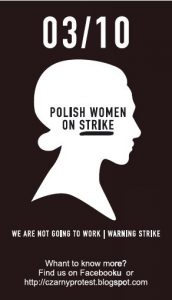
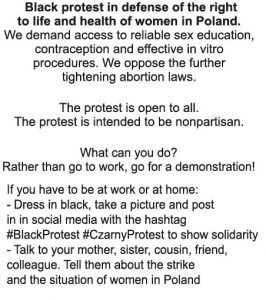 Today Polish women are going on a strike!!Today, 3 October, Polish women are going on a strike as a sign of protest. Inspired by women of Iceland who went on strike over a range of gender equality issues in 1975, this strike is strictly in reaction to the Polish government’s attempts to further tighten the already very restrictive law on abortion. It is a completely grassroots initiative, people are discussing possible activities and potential moves via internet, planning protests and street actions across Poland and also in other cities.According to the Krakow Post, official protests are planned in over 60 Polish cities and 10 European capitals so far. The demonstrations should reach their peak at 6pm. Many companies large and small openly support the protest and might not open on Monday. For example, a group reports that in Romania, Polish and Romanian activists are organising a protest march in Bucharest on 3 October in support of Polish women’s plight. In addition, they are sharing a compelling documentary about the history of the impact of the pro-natalist, anti-abortion regime in Romania in the past under Ceaucescu, so that people will not forget, so that people will imagine what could happen again.The strike has received support from high profile Polish figures, including super model Anja Rubik. Her tweet one week ago received 12,600 likes. We will share more on social media as we hear it.On 6 October, the European Parliament will hold a debate on the status of women’s reproductive rights in Poland. The debate was initiated by the Alliance of Liberals and Democrats for Europe in the European Parliament (ALDE Group). The Polish Prime Minister, Beata Szydło, has criticised this initiative, claiming that the “European Parliament is simply starting to lose credibility”.***NICARAGUA
Today Polish women are going on a strike!!Today, 3 October, Polish women are going on a strike as a sign of protest. Inspired by women of Iceland who went on strike over a range of gender equality issues in 1975, this strike is strictly in reaction to the Polish government’s attempts to further tighten the already very restrictive law on abortion. It is a completely grassroots initiative, people are discussing possible activities and potential moves via internet, planning protests and street actions across Poland and also in other cities.According to the Krakow Post, official protests are planned in over 60 Polish cities and 10 European capitals so far. The demonstrations should reach their peak at 6pm. Many companies large and small openly support the protest and might not open on Monday. For example, a group reports that in Romania, Polish and Romanian activists are organising a protest march in Bucharest on 3 October in support of Polish women’s plight. In addition, they are sharing a compelling documentary about the history of the impact of the pro-natalist, anti-abortion regime in Romania in the past under Ceaucescu, so that people will not forget, so that people will imagine what could happen again.The strike has received support from high profile Polish figures, including super model Anja Rubik. Her tweet one week ago received 12,600 likes. We will share more on social media as we hear it.On 6 October, the European Parliament will hold a debate on the status of women’s reproductive rights in Poland. The debate was initiated by the Alliance of Liberals and Democrats for Europe in the European Parliament (ALDE Group). The Polish Prime Minister, Beata Szydło, has criticised this initiative, claiming that the “European Parliament is simply starting to lose credibility”.***NICARAGUA 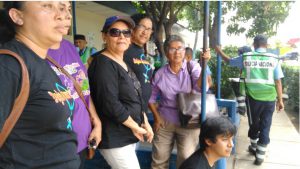 Police arrest and detain human rights defenders at a peaceful protest for the right to decide on 28 SeptemberOn 28 September, International Day for the Decriminalisation of Abortion, defenders of human rights protested in front of the National Assembly of Nicaragua, demanding that the Nicaraguan state allow women to exercise their right to decide over their own bodies.The activists held banners with the slogan “Illegal abortion = state violence”, and wore T-shirts with the slogan “Stop killing women”.They symbolically spilled red paint to signify the blood of those women who have died because they did not have access to a safe abortion, many of them with serious medical complications. Among the defenders were feminists Celia Contreras, Luisa Molina, María de Jesús Tenorio, Jessica Hernández y Patricia Orozco. Giving coverage of the activity were Duyerling Rivers and Abixael Mogollón, journalists from OndaLocal.All of a sudden more than 20 policemen appeared in two vans and on several motorcycles. They took many photographs and asked for documents about the van the group had come in, and also for the identification papers of the activists, and then arrested them. At the same time as the arrests, Abixael Mogollón was handcuffed and taken away from the rest of the group because he was taking photographs of the arbitrary and illegal arrest of the activists. Several men in civilian clothes took photographs of Mogollón and commandeered his cell phone, identification papers, and other personal items.Then both the journalists and defenders were transferred to the District One station of the National Police in Managua, where they were detained for more than an hour. They were subsequently released without even the offer of an explanation for the detention.Patricia Orozco said in front of the media that what they did was an act of intimidation against those who demand their rights. “It has already been ten years since the reform of the Penal Code, which penalized all abortions, with the full support of the Frente Sandinista,” she said.Translated from OndaLocal, 28 Sept 2016*********************************************************EUROPE ***NETHERLANDS
Police arrest and detain human rights defenders at a peaceful protest for the right to decide on 28 SeptemberOn 28 September, International Day for the Decriminalisation of Abortion, defenders of human rights protested in front of the National Assembly of Nicaragua, demanding that the Nicaraguan state allow women to exercise their right to decide over their own bodies.The activists held banners with the slogan “Illegal abortion = state violence”, and wore T-shirts with the slogan “Stop killing women”.They symbolically spilled red paint to signify the blood of those women who have died because they did not have access to a safe abortion, many of them with serious medical complications. Among the defenders were feminists Celia Contreras, Luisa Molina, María de Jesús Tenorio, Jessica Hernández y Patricia Orozco. Giving coverage of the activity were Duyerling Rivers and Abixael Mogollón, journalists from OndaLocal.All of a sudden more than 20 policemen appeared in two vans and on several motorcycles. They took many photographs and asked for documents about the van the group had come in, and also for the identification papers of the activists, and then arrested them. At the same time as the arrests, Abixael Mogollón was handcuffed and taken away from the rest of the group because he was taking photographs of the arbitrary and illegal arrest of the activists. Several men in civilian clothes took photographs of Mogollón and commandeered his cell phone, identification papers, and other personal items.Then both the journalists and defenders were transferred to the District One station of the National Police in Managua, where they were detained for more than an hour. They were subsequently released without even the offer of an explanation for the detention.Patricia Orozco said in front of the media that what they did was an act of intimidation against those who demand their rights. “It has already been ten years since the reform of the Penal Code, which penalized all abortions, with the full support of the Frente Sandinista,” she said.Translated from OndaLocal, 28 Sept 2016*********************************************************EUROPE ***NETHERLANDS ![]()
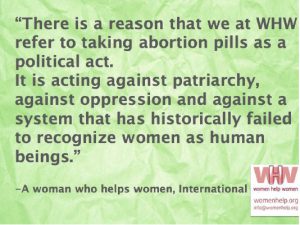
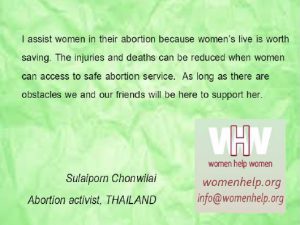 Women Help Women (WHW)Women Help Women published an article on Sex Rights Africa Network’s website for September 28th about abortion stigma: Empowering women and de-stigmatising abortion with pills.On #Sept28 2016, International Safe Abortion Day, Women Help Women launched a collection of statements and stories from people who risk jail to help others access abortion, entitled: “Women help women everywhere. We help because it is a moral thing to do.” We share six of them here.E-mail us at partner@womenhelp.org if you want to share your story (anonymously)
Women Help Women (WHW)Women Help Women published an article on Sex Rights Africa Network’s website for September 28th about abortion stigma: Empowering women and de-stigmatising abortion with pills.On #Sept28 2016, International Safe Abortion Day, Women Help Women launched a collection of statements and stories from people who risk jail to help others access abortion, entitled: “Women help women everywhere. We help because it is a moral thing to do.” We share six of them here.E-mail us at partner@womenhelp.org if you want to share your story (anonymously)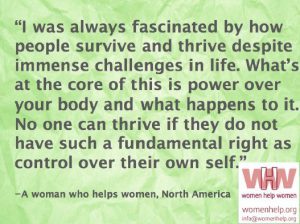
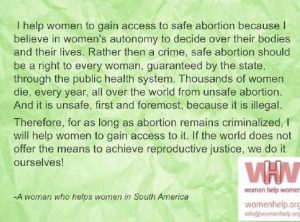
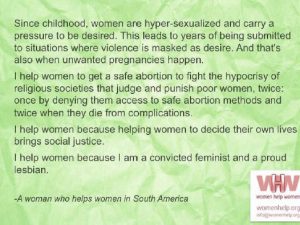
 ***UK
***UK 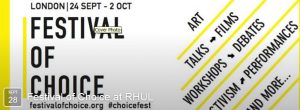 Festival of ChoiceIn London between 24 September and 2 October, there was a fundraiser for the Abortion Support Network, a quiz/music evening , a party for choice, and on on 2 October, a broad coalition of groups organised and participated in a full day of events that included:
Festival of ChoiceIn London between 24 September and 2 October, there was a fundraiser for the Abortion Support Network, a quiz/music evening , a party for choice, and on on 2 October, a broad coalition of groups organised and participated in a full day of events that included:
- A panel of speakers from the UK and Ireland on the local and global state of abortion rights campaigning, including a slideshow on 8 September around the world.
- A panel on reproductive rights in Central and Eastern Europe with speakers from the region studying in UK
- A panel on progress and challenges in the first for sexual and reproductive rights in Latin America, with speakers from the region living in London.
- A workshop on tactics for direct action.
- A workshop on doctors in the fight for reproductive justice.
- A talk with Speaking of Imelda.
- A dance performance, an installation, a spoken word performance, a session on pro-choice craftwork and zine making, an exhibitions of art and one of photographs, and the showing of a series of pro-choice videos.
The room was packed with participants from many countries, the great majority young women, and the questions and discussion after each speaker got to the heart of the issues.***ARMENIA Women’s Rights CenterMeeting/discussion devoted to 28 SeptemberThe Women’s Rights Center organised a meeting-discussion devoted to the Global Day of Action for Safe and Legal Abortion. Women victims of domestic violence, Women’s Rights Center staff and volunteers participated in the meeting. The main aim of the event was to disseminate more information on women’s reproductive health and rights and on safe abortion methods, and information about the day of action itself and what was happening internationally, .Women mentioned their lack of awareness and knowledge on the issues of reproductive and sexual health and rights. They highlighted its importance as the basis of healthy families. Women were encouraged to take care of their reproductive health, seek help from doctors with any problems and to choose a safe abortion method for terminating an unwanted pregnancy.There have been changes to the abortion law introduced by the Armenian Government without any consultation with civil society, medical or women’s groups. Abortion remains accessible until the 12th week but Article 10 of the Law on Reproductive Health and Rights was amended to ban sex-selective abortion after the first trimester. A mandatory three-day waiting period was also added supposedly to allow gynaecologists time to provide counselling, which was made mandatory.According to someone in the Armenian Ministry of Health, the Ministry aims to make it more difficult for women to have an abortions through imposing this delay. Yet the Ministry claims these amendments do not question the right and access to legal abortion. In a statement on these changes, the Women’s Rights Centre explains why they are restrictive in intent and practice.***ARMENIA
Women’s Rights CenterMeeting/discussion devoted to 28 SeptemberThe Women’s Rights Center organised a meeting-discussion devoted to the Global Day of Action for Safe and Legal Abortion. Women victims of domestic violence, Women’s Rights Center staff and volunteers participated in the meeting. The main aim of the event was to disseminate more information on women’s reproductive health and rights and on safe abortion methods, and information about the day of action itself and what was happening internationally, .Women mentioned their lack of awareness and knowledge on the issues of reproductive and sexual health and rights. They highlighted its importance as the basis of healthy families. Women were encouraged to take care of their reproductive health, seek help from doctors with any problems and to choose a safe abortion method for terminating an unwanted pregnancy.There have been changes to the abortion law introduced by the Armenian Government without any consultation with civil society, medical or women’s groups. Abortion remains accessible until the 12th week but Article 10 of the Law on Reproductive Health and Rights was amended to ban sex-selective abortion after the first trimester. A mandatory three-day waiting period was also added supposedly to allow gynaecologists time to provide counselling, which was made mandatory.According to someone in the Armenian Ministry of Health, the Ministry aims to make it more difficult for women to have an abortions through imposing this delay. Yet the Ministry claims these amendments do not question the right and access to legal abortion. In a statement on these changes, the Women’s Rights Centre explains why they are restrictive in intent and practice.***ARMENIA Society Without ViolenceSociety Without Violence organised a public film viewing, in its office in Yerevan, of the film “Citizen Ruth”, which tells the story of a pregnant woman who unexpectedly attracts attention from those involved in the debate about the morality and legality of abortion. The film attacks the abortion debate as in itself being an unnecessary infringement on the bodily integrity of women. After the screening, the participants held a discussion about the status of abortion in Armenia, the problem of sex-selective abortion and how to tackle it without infringing the rights of women, and the abortion debate in general.***MACEDONIA
Society Without ViolenceSociety Without Violence organised a public film viewing, in its office in Yerevan, of the film “Citizen Ruth”, which tells the story of a pregnant woman who unexpectedly attracts attention from those involved in the debate about the morality and legality of abortion. The film attacks the abortion debate as in itself being an unnecessary infringement on the bodily integrity of women. After the screening, the participants held a discussion about the status of abortion in Armenia, the problem of sex-selective abortion and how to tackle it without infringing the rights of women, and the abortion debate in general.***MACEDONIA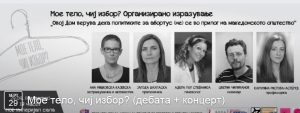 H.E.R.A H.E.R.A. in Macedonia organised a debate on 29th September on the politics of the slogan “My body, whose choice?” together with the Youth Educational Forum (MOF), Tiiiit! Inc, and the Coalition “Sexual and Health Rights of Marginalized Communities”, all of whom are members of the Gender Platform. The event brought together prominent public figures and politicians and was open to the public. The day ended with a concert. The event was promoted on social media and gathered a lot of interest. For more information see the Facebook event here.***CROATIA
H.E.R.A H.E.R.A. in Macedonia organised a debate on 29th September on the politics of the slogan “My body, whose choice?” together with the Youth Educational Forum (MOF), Tiiiit! Inc, and the Coalition “Sexual and Health Rights of Marginalized Communities”, all of whom are members of the Gender Platform. The event brought together prominent public figures and politicians and was open to the public. The day ended with a concert. The event was promoted on social media and gathered a lot of interest. For more information see the Facebook event here.***CROATIA 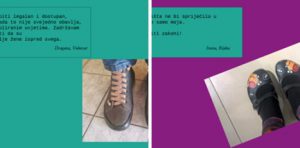 PaRiter10 Days of Action in CroatiaPaRiter, an association for human rights and citizen participation in Rijeka, started a campaign in 2016 dedicated to women’s rights, especially women’s reproductive rights called: “Ten days of action against the collapse of women’s reproductive rights”.The campaign aimed to link together the National Day against Violence against Women (September 22nd), International Contraception Day (September 26th), Global Day of Action for Safe and Legal Abortion (September 28th) and International Day of Non-Violence (October 2nd).This year’s topic was CEDAW’s recommendations to the Croatian Government in July 2015, which have not yet been implemented, including those on sexual and reproductive health and rights. PaRiter has launched a petition and signatures are being collected calling on the Government to implement the recommendations. In a radio broadcast on International Contraception Day, prominent gynaecologists spoke about contraception and its contribution to women’s empowerment. And for 28 September, the group collected stories on abortion and put them on a virtual mural for 28th of September. Other activities included a roundtable on keeping the government accountable through activism and academia and an information booth in the city.This campaign was motivated by the fact that women’s rights in Croatia have been decreasing since the 1990s and most immediately because several health organizations and the Church organised a seminar for doctors on women’s health and Canonic law on 16-18 September, under the patronage of the Croatian President.***EUROPE
PaRiter10 Days of Action in CroatiaPaRiter, an association for human rights and citizen participation in Rijeka, started a campaign in 2016 dedicated to women’s rights, especially women’s reproductive rights called: “Ten days of action against the collapse of women’s reproductive rights”.The campaign aimed to link together the National Day against Violence against Women (September 22nd), International Contraception Day (September 26th), Global Day of Action for Safe and Legal Abortion (September 28th) and International Day of Non-Violence (October 2nd).This year’s topic was CEDAW’s recommendations to the Croatian Government in July 2015, which have not yet been implemented, including those on sexual and reproductive health and rights. PaRiter has launched a petition and signatures are being collected calling on the Government to implement the recommendations. In a radio broadcast on International Contraception Day, prominent gynaecologists spoke about contraception and its contribution to women’s empowerment. And for 28 September, the group collected stories on abortion and put them on a virtual mural for 28th of September. Other activities included a roundtable on keeping the government accountable through activism and academia and an information booth in the city.This campaign was motivated by the fact that women’s rights in Croatia have been decreasing since the 1990s and most immediately because several health organizations and the Church organised a seminar for doctors on women’s health and Canonic law on 16-18 September, under the patronage of the Croatian President.***EUROPE 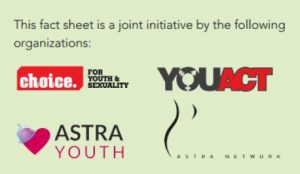 YouAct, European Youth Network on Sexual and Reproductive Health and RightsYouAct marked the day by sharing our recent work on abortion rights, conducted with our partners (ASTRA Network, ASTRA Youth, CHOICE for Youth and Sexuality):
YouAct, European Youth Network on Sexual and Reproductive Health and RightsYouAct marked the day by sharing our recent work on abortion rights, conducted with our partners (ASTRA Network, ASTRA Youth, CHOICE for Youth and Sexuality):
- A Joint Statement and Call to Action on the current debate on abortion and threat to reproductive rights for women in Poland that was endorsed by more than 50 organisations and sent to the Polish Prime Minister in mid-September.
- A Factsheet on Abortion in Europethat aims to raise awareness about women’s and girl’s rights to safe and legal abortion and to encourage the reader to engage in ongoing discussions about reproductive rights.
Our members also contributed with photos and messages to the #StepIntoOurShoes campaignhttp://www.september28.org/mural/ .*******************************************************LATIN AMERICA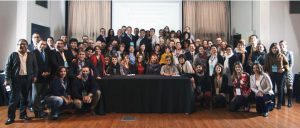 ARGENTINARed de Acceso al Aborto Seguro (REDAAS)1st Latin American meeting of public providers of safe and legal abortions: reportREDAAS is a non-profit network of health and legal professionals linked to public health and community services in Argentina, who are committed to accompanying and assisting women in seeking a legal abortion, understanding this to be part of our professional ethical and legal duty.On 28 September, we think it important to tell you about the 1st Latin American meeting of public providers of safe and legal abortions that took place in the city of Buenos Aires on 11-12 August 2016. The meeting was attended by almost 100 health professionals and was jointly convened by REDAAS and the Red Peruana de Acceso al Aborto Seguro (Peruvian Network of Access to Safe Abortion, REDPAAS) and organised by the Centro de Estudios de Estado y Sociedad (, Centre for the Study of State and Society, CEDES) together with the Equipo Latinoamericano de Justicia y Género (Latin American Group on Justice and Gender, ELA). It was also supported by other international organizations, such as CLACAI, PROMSEX, International Women’s Health Coalition, Ipas, IPPF and PP Global.You can watch interviews with some of the participants here.You can access the excellent presentations here.You can find the virtual report here.You can find a statement for 28 September by the Campaña Nacional por el Derecho al Aborto Legal, Seguro y Gratuito of Argentina (National Campaign for Safe, Legal and Free Abortion) here.***BRAZIL
ARGENTINARed de Acceso al Aborto Seguro (REDAAS)1st Latin American meeting of public providers of safe and legal abortions: reportREDAAS is a non-profit network of health and legal professionals linked to public health and community services in Argentina, who are committed to accompanying and assisting women in seeking a legal abortion, understanding this to be part of our professional ethical and legal duty.On 28 September, we think it important to tell you about the 1st Latin American meeting of public providers of safe and legal abortions that took place in the city of Buenos Aires on 11-12 August 2016. The meeting was attended by almost 100 health professionals and was jointly convened by REDAAS and the Red Peruana de Acceso al Aborto Seguro (Peruvian Network of Access to Safe Abortion, REDPAAS) and organised by the Centro de Estudios de Estado y Sociedad (, Centre for the Study of State and Society, CEDES) together with the Equipo Latinoamericano de Justicia y Género (Latin American Group on Justice and Gender, ELA). It was also supported by other international organizations, such as CLACAI, PROMSEX, International Women’s Health Coalition, Ipas, IPPF and PP Global.You can watch interviews with some of the participants here.You can access the excellent presentations here.You can find the virtual report here.You can find a statement for 28 September by the Campaña Nacional por el Derecho al Aborto Legal, Seguro y Gratuito of Argentina (National Campaign for Safe, Legal and Free Abortion) here.***BRAZIL 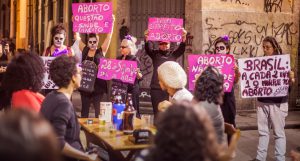 Finadas do Aborto e Frente Estadual pela Descriminalização do Aborto do Rio de Janeiro Flashmob for 28 September35 fabulous photographs on Flickr. The groups walked around with their placards in this busy square, which was full of people out for the evening, and they set up a table where people could write a short message in memory of women who had died from unsafe abortions.***MEXICO
Finadas do Aborto e Frente Estadual pela Descriminalização do Aborto do Rio de Janeiro Flashmob for 28 September35 fabulous photographs on Flickr. The groups walked around with their placards in this busy square, which was full of people out for the evening, and they set up a table where people could write a short message in memory of women who had died from unsafe abortions.***MEXICO  Ipas MexicoNine years of decriminalisation of abortion in Mexico City: videoWhen talking about September 28th, International Day for the Decriminalisation of Abortion, we must talk about Mexico City and its nine years of decriminalisation, and also that we have safe procedures for legal termination of pregnancy in safe conditions, with the high standard of services and methods required, from trained health service providers and nurses. Watch this video, Esto es Un Motivo, which tells you that of 165,000 legal abortions in Mexico City in those nine years, there has not been even one death. #EstoEsUnMotivo #28sept#DíaInternacionalPorLaDespenalizaciónDelAborto #AbortoSeguro#AbortoLegal*******************************************************AFRICA KENYA
Ipas MexicoNine years of decriminalisation of abortion in Mexico City: videoWhen talking about September 28th, International Day for the Decriminalisation of Abortion, we must talk about Mexico City and its nine years of decriminalisation, and also that we have safe procedures for legal termination of pregnancy in safe conditions, with the high standard of services and methods required, from trained health service providers and nurses. Watch this video, Esto es Un Motivo, which tells you that of 165,000 legal abortions in Mexico City in those nine years, there has not been even one death. #EstoEsUnMotivo #28sept#DíaInternacionalPorLaDespenalizaciónDelAborto #AbortoSeguro#AbortoLegal*******************************************************AFRICA KENYA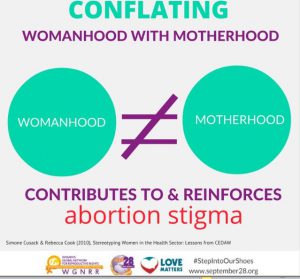 @FelistahNgui at #MamanetworkWomen Help Women, TICAH Kenya and groups from 7 sub-Saharan African countries We jointly launched the MAMA network (Mobilising Activists around Medical Abortion) that is co-convened by WHW. The programme is supported by AmplifyChange. The aims of the MAMA network are to improve the quality of information and services locally, create new resources for women and community health workers, and strengthen the outreach and visibility of local hotlines through joint action. The programme mobilises community health workers and lay activists to share information about abortion pills and become advocates for abortion rights.
@FelistahNgui at #MamanetworkWomen Help Women, TICAH Kenya and groups from 7 sub-Saharan African countries We jointly launched the MAMA network (Mobilising Activists around Medical Abortion) that is co-convened by WHW. The programme is supported by AmplifyChange. The aims of the MAMA network are to improve the quality of information and services locally, create new resources for women and community health workers, and strengthen the outreach and visibility of local hotlines through joint action. The programme mobilises community health workers and lay activists to share information about abortion pills and become advocates for abortion rights.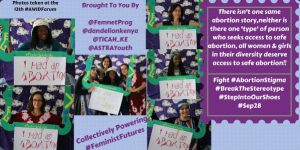 Aunty Jane Hotline, Kenya @YourAuntyJane at #Mamanetwork***MOZAMBIQUE
Aunty Jane Hotline, Kenya @YourAuntyJane at #Mamanetwork***MOZAMBIQUE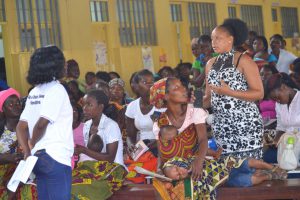 Mozambican Coalition for Sexual and Reproductive RightsNow what? Challenges of implementing a new law that decriminalizes abortion
Mozambican Coalition for Sexual and Reproductive RightsNow what? Challenges of implementing a new law that decriminalizes abortion 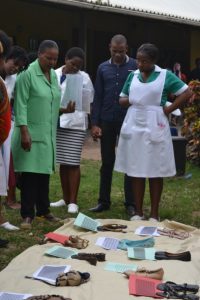

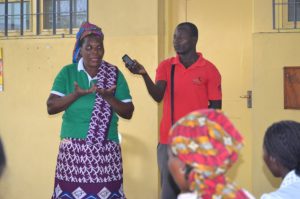
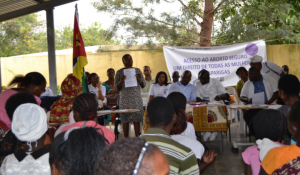 In Manhiça, a town one hour outside of Maputo, the Coalition for Sexual and Reproductive Rights organized an event to mark International Abortion Day. On the premises of the district hospital, the Coalition gathered health providers, health authorities from the district level, representatives of different institutions, local leaders, and of course many women, and a few men, from the town and from the health facility where they were providing/seeking health care services at the time.The event included the testimonies of a woman from the community who shared her personal experiences dealing with the complications, struggle, and even death as a result of unsafe abortions. A local leader also contributed and reflected on the existing stigma surrounding abortion in the community and noted the importance of educating men and women in the community, in order to end the myths of abortion that contribute to discrimination against and stigmatisation of women. This is especially important seeing that the new law has made abortion legal in certain circumstances. A representative from the district health services addressed how influential the implementation of the new law will be in the reduction of maternal mortality and morbidity.The event included the initiative “Step into Our Shoes,” which is symbolic and represents the real stories of women who have had abortions. This display calls attention to the diversity of women who choose to terminate a pregnancy and the different situations they experience when making this decision. The display is also a symbol of agency and diversity, which are integral components of our ongoing efforts to utilise and advance a positive, “normalising” framework in our abortion advocacy.Finally, a theatrical performance brought the audience closer to the story of a young girl who experienced an unsafe abortion. This play is intended to be used broadly to sensitise communities to the risks of unsafe abortion and to inform others about the current law, as well as about the uptake and importance of contraceptives.On 29 September, the Coalition held a workshop in Maputo to analyze and reflect on the country’s current abortion context with key representatives from the Ministry of Health.Mozambique recently experienced an important legal reform, moving the country towards less restrictive abortion policies. The law, which has been in effect since July 2015, decriminalizes abortion until the 12th week of pregnancy (and up to 16 weeks in cases of rape). However, there is more work to be done in order for the law to effectively reduce maternal mortality and morbidity, increase knowledge of the law, and increase access to safe abortions. The Ministry of Health has recently approved the clinical norms which must be implemented now, as they are integral to the health of women and children. The Coalition for Sexual and Reproductive Rights is also contributing by raising awareness within communities about the new law and advocating for the drafting of comprehensive abortion regulations to ensure the widest access to safe abortions for women and girls.A survey conducted by Pathfinder International (with the support of SAAF and in partnership with WLSA) in May of this year, which included 164 health providers from four provinces, showed that only 53% of the interviewed providers were familiar with the new abortion law and furthermore, only 57% of providers would be willing to provide an abortion in a legalized context. Seeing that these results come from health facilities where awareness raising activities have already taken place, it is clear that challenges remain in order for this law to be fully implemented. In this context, the Coalition is conscious of the challenges ahead, but is also hopeful for the future of the enabling environment that is being created.The Coalition for Sexual and Reproductive Rights brings together the following organizations: AMMCJ, AMODEFA, AMOG, APARMO, Coalizao’, Forum Mulher, HOPEM, Horizonte Azul, ICRW, Lambda, Muleide, Nweti, Pathfinder International, ICRW, and WLSA Mozambique. ***NIGERIA
In Manhiça, a town one hour outside of Maputo, the Coalition for Sexual and Reproductive Rights organized an event to mark International Abortion Day. On the premises of the district hospital, the Coalition gathered health providers, health authorities from the district level, representatives of different institutions, local leaders, and of course many women, and a few men, from the town and from the health facility where they were providing/seeking health care services at the time.The event included the testimonies of a woman from the community who shared her personal experiences dealing with the complications, struggle, and even death as a result of unsafe abortions. A local leader also contributed and reflected on the existing stigma surrounding abortion in the community and noted the importance of educating men and women in the community, in order to end the myths of abortion that contribute to discrimination against and stigmatisation of women. This is especially important seeing that the new law has made abortion legal in certain circumstances. A representative from the district health services addressed how influential the implementation of the new law will be in the reduction of maternal mortality and morbidity.The event included the initiative “Step into Our Shoes,” which is symbolic and represents the real stories of women who have had abortions. This display calls attention to the diversity of women who choose to terminate a pregnancy and the different situations they experience when making this decision. The display is also a symbol of agency and diversity, which are integral components of our ongoing efforts to utilise and advance a positive, “normalising” framework in our abortion advocacy.Finally, a theatrical performance brought the audience closer to the story of a young girl who experienced an unsafe abortion. This play is intended to be used broadly to sensitise communities to the risks of unsafe abortion and to inform others about the current law, as well as about the uptake and importance of contraceptives.On 29 September, the Coalition held a workshop in Maputo to analyze and reflect on the country’s current abortion context with key representatives from the Ministry of Health.Mozambique recently experienced an important legal reform, moving the country towards less restrictive abortion policies. The law, which has been in effect since July 2015, decriminalizes abortion until the 12th week of pregnancy (and up to 16 weeks in cases of rape). However, there is more work to be done in order for the law to effectively reduce maternal mortality and morbidity, increase knowledge of the law, and increase access to safe abortions. The Ministry of Health has recently approved the clinical norms which must be implemented now, as they are integral to the health of women and children. The Coalition for Sexual and Reproductive Rights is also contributing by raising awareness within communities about the new law and advocating for the drafting of comprehensive abortion regulations to ensure the widest access to safe abortions for women and girls.A survey conducted by Pathfinder International (with the support of SAAF and in partnership with WLSA) in May of this year, which included 164 health providers from four provinces, showed that only 53% of the interviewed providers were familiar with the new abortion law and furthermore, only 57% of providers would be willing to provide an abortion in a legalized context. Seeing that these results come from health facilities where awareness raising activities have already taken place, it is clear that challenges remain in order for this law to be fully implemented. In this context, the Coalition is conscious of the challenges ahead, but is also hopeful for the future of the enabling environment that is being created.The Coalition for Sexual and Reproductive Rights brings together the following organizations: AMMCJ, AMODEFA, AMOG, APARMO, Coalizao’, Forum Mulher, HOPEM, Horizonte Azul, ICRW, Lambda, Muleide, Nweti, Pathfinder International, ICRW, and WLSA Mozambique. ***NIGERIA 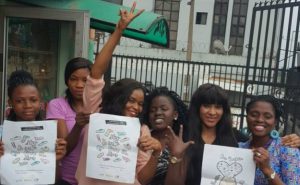 Generation Initiative for Women and Youth Network in Lagos/Owerri (GIWYN) UPDATE: September 28th Campaign GIWYN and the National Coalition Members and others celebrated the Sept 28 Campaign in three states in Nigeria, Lagos, Imo States and Edo. The activities included:
Generation Initiative for Women and Youth Network in Lagos/Owerri (GIWYN) UPDATE: September 28th Campaign GIWYN and the National Coalition Members and others celebrated the Sept 28 Campaign in three states in Nigeria, Lagos, Imo States and Edo. The activities included:
- Created a blog with wonderful photos of our activities.
- In Lagos, seven organizations from the Coalition Network organized in different locations; they include the Federated Women Alliance, Royal Skills Empowerment for Girls , Mother and Child Initiative, Learning Word and Rehoboth Foundation. In the Forum, women identified that women’s shoes speak different languages and tell diverse stories of Abortion to end stigma and gender stereotypes. The participants expressed their appreciation for abortion stories by painting in the Colouring Book, indicating diverse needs for termination of pregnancy. The women are of the view that abortion should be safe and legal to end all the deaths and complications caused by unsafe abortion. In conclusion Sybil stated that the black-and-white shoe-flyers symbolized different stories of women and girls about their reproductive health. However, when the shoes are painted, they represent the coming together of all organizations and individuals to carry out advocacy to end abortion stigma in Nigeria.
- In Edo State women spoke that the policy makers and the society at large should actually step into the shoes of those women who went through an abortion experience and understand the realities to make it stigma free and establish abortion as women’s human right.
- In Imo State, 40 people which included nurses, midwives, traditional birth attendants and doctors attended the event to ensure that access to reproductive health services, contraceptives and essential drugs are accessible to all to reduce gender stereotypes.
- GIWYN social media reached 9,290 people.
The events made the participants, including health providers and politicians, aware that abortion should be seen as a right, not a privilege. We helped them to differentiate between myths and facts about abortion, and created a safe platform for interaction between young and old, policy makers, members of civil society and human rights organizations, to exchange ideas and create awareness, with the aim of ending unsafe abortion and gender stereotyping.***GHANA 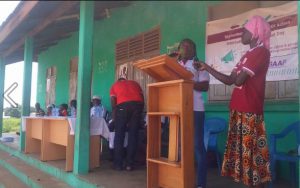 Save GhanaLocal meeting At this local meeting, the representative of the District Health Director lamented the difficulties which health facilities face in order to treat victims of unsafe abortion who arrive at late stages in their predicament (with excessive bleeding). She appealed to everyone to desist from having unsafe abortions and bemoaned some repercussions of the use of unapproved means of causing an abortion. She told the participants to feel free to come to local health facilities to have a safe abortion. The Executive Director of Asudeve, Mr Kanton Osuman, called on all and sundry to eliminate abortion stigma and gender stereotyping. The Headmaster of Tumu Secondary Technical School entreated all participants at this year’s event to be ambassadors of safe abortion and educate their peers on what they have learnt from the event. He also said students should reach out to their guidance and counselling masters for help on abortion. And even said female students are at liberty to defer studies and return after delivery. The guest of honour, Hon. DCE Saborh Juasuglo, attributed unsafe abortions in the country to causes such as economic hardship, poverty and socio-cultural barriers as dominant causes. He maintained that abortion is not a heinous crime. He also underscored a number projects being put up by government to curb unsafe abortion.
Save GhanaLocal meeting At this local meeting, the representative of the District Health Director lamented the difficulties which health facilities face in order to treat victims of unsafe abortion who arrive at late stages in their predicament (with excessive bleeding). She appealed to everyone to desist from having unsafe abortions and bemoaned some repercussions of the use of unapproved means of causing an abortion. She told the participants to feel free to come to local health facilities to have a safe abortion. The Executive Director of Asudeve, Mr Kanton Osuman, called on all and sundry to eliminate abortion stigma and gender stereotyping. The Headmaster of Tumu Secondary Technical School entreated all participants at this year’s event to be ambassadors of safe abortion and educate their peers on what they have learnt from the event. He also said students should reach out to their guidance and counselling masters for help on abortion. And even said female students are at liberty to defer studies and return after delivery. The guest of honour, Hon. DCE Saborh Juasuglo, attributed unsafe abortions in the country to causes such as economic hardship, poverty and socio-cultural barriers as dominant causes. He maintained that abortion is not a heinous crime. He also underscored a number projects being put up by government to curb unsafe abortion.



